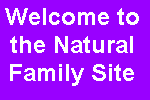 |

Natural Living
The amazing thing is that you can easily limit your exposure to toxic substances with just a little knowledge and thought on your part. I was never concerned about these topics until I had my baby, but now that I see the number of things he touches and puts right into his mouth, I have a much higher sensitivity to these concerns. Also, chemicals that I am exposed to can flow directly to my baby through my breast milk, and that is a big concern to me as well. Also, pregnant women need to be aware that toxins go straight into the baby's bloodstream and have a huge effect on the fetus. While we all are aware of this with things like alcohol and tobacco, we often overlook the huge array of toxins we use around the house every day.
So why don't we know more about the toxins we are exposed to every day, and why are they not reported on the nightly news and in every newspaper? I feel it has a lot to do with money and corporate greed. For example, some studies of chemicals that find a chemical to be safe and to not cause birth defects use "infant death" as their definition for a defect! Any normal person obviously uses a much different definition of "defect". Therefore, many chemicals appear to be much safer than they really are.
This page links you to several important sites that discuss positive steps you can take to limit your children's exposure to toxic substances. See also the books page for several great books on the subject of home toxins.
-
Envirolink: The On-Line Environmental Community
-
Great Site! Especially the following 2 links:
This page is an index to articles discussing toxicity in everyday items ranging from: landscaping chemicals, to cookware, to diapers and carpeting.
Also great is this page which tells you how to clean your house without using toxic chemicals. It tells you what supplies (mostly simple things like baking soda and salt, etc.) to buy and how to use them. Great page!
-
The Environmental Health Clearinghouse provides substantive information and key documents on a variety of environmental health issues.
This page on their site is very good and deals with questions about toxins in the home. (toxic cleaning supplies, carpet, paint, high current power lines, etc.)
-
Mothers & Others
-
Mothers and Others is a nonprofit organization that works to promote consumer choices which are
safe and ecologically sustainable for this generation and the next. Their newsletter (called "The Green Guide") distributted to 35,000
households. Their website offers several feature articles on topics such
as "Toxic Dentistry" and "Kids' Vulnerability to Pesticides", but mostly it tells you about their organization and how to subscribe to their newsletter.
One of the founding mothers of this organization is actress Meryl Streep.
They also have a great set of environmently friendly web links at
this page.
-
Newspaper Column "Surviving in a Chemical World"
-
These are wonderful articles, very easy to read and informative. Be sure to read the one on entitled
"Does Your Supermarket Treat Its Produce?" (note: their link doesn't work, just scroll down the page until
you find this article). If 1/10 of what they say in that article is true, then that is an extremely scarey article! Also read the
article entitled "Pesticides in Babyfood".
-
GreenPeace page on PVC toys
-
Greenpeace cites information and an extensive set of studies that show that many common toys (especially teethers) contain
PVC that could be extremely toxic to children. In their list of toys tested and shown to contain PVC,
I discovered my baby had 3 of them. Researchers claim PVC is easily absorbed by children who play with or chew on these toys.
The articles claim that Target stores have agreed to pull these items off their shelves but Toys R Us has not.
-
BGH Hormone in Milk
-
This is an article about how the
BGH hormone in milk has been linked to cancer.
Great Books!
Living Healthy in a Toxic World : Simple Steps to Protect You and Your Family from Everyday Chemicals, Poisons, and Pollution by David Steinman, Michael R. Wisner
|

BYG Publishing, Inc.
http://www.bygpub.com - info@bygpub.com
(888)294-7820 - P.O. Box 40492 - Raleigh, NC 27629
Questions or comments, email:
questions@bygpub.com
© 1997 BYG Publishing, Inc. All rights reserved.